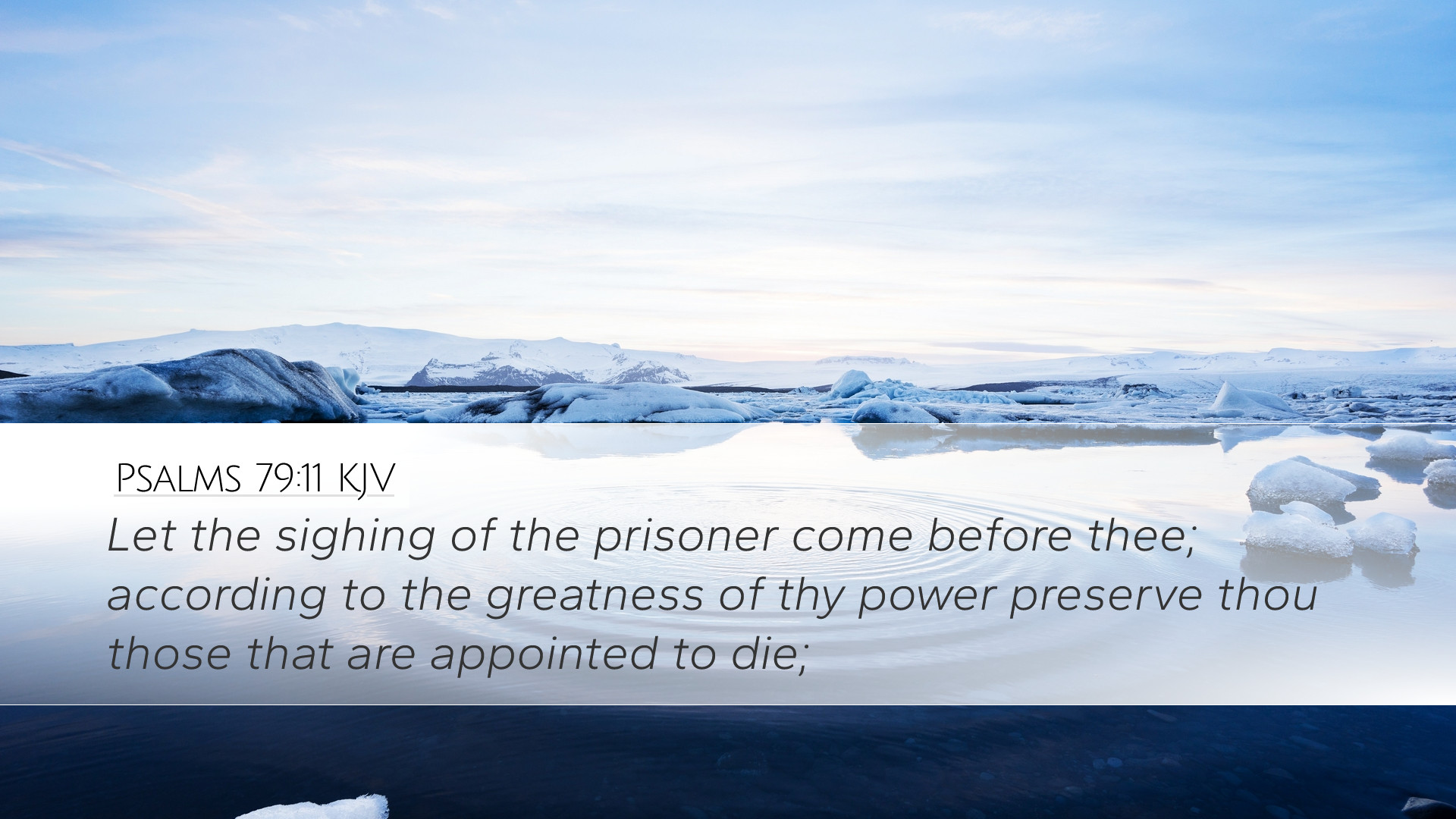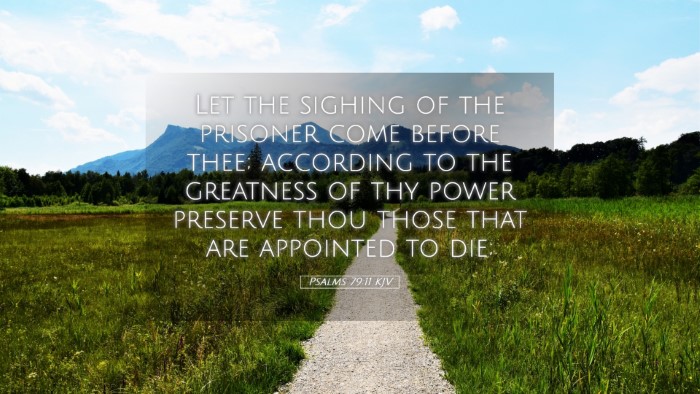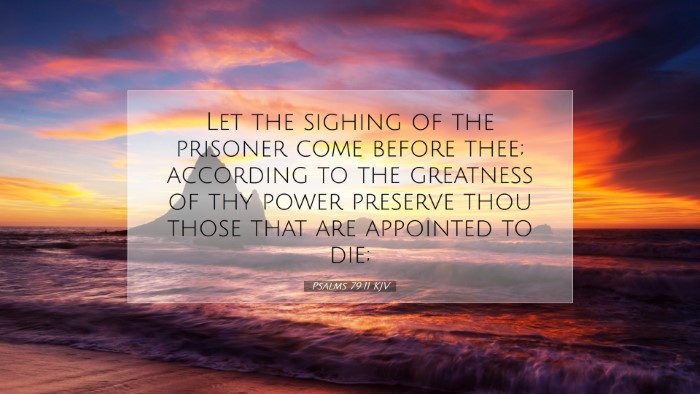Commentary on Psalms 79:11
Bible Verse: "Let the groaning of the prisoner come before You; According to the greatness of Your power, Preserve those who are being condemned."
This verse from Psalms encapsulates a profound plea for divine intervention and deliverance. The psalmist speaks to God, pleading for His attention to the sufferings of the oppressed and imprisoned. Various public domain commentaries shed light on its significance.
Contextual Background
Historical Setting: Psalm 79 is often regarded as a communal lament, reflecting on the distress of Israel following a catastrophic event such as the destruction of Jerusalem. The psalmist calls out to God in the face of national turmoil, appealing for mercy and justice.
"Prison" in this context may refer to both literal imprisonment and metaphorical captivity, relating to the broader theme of oppression experienced by God’s people. Understanding the historical context helps illuminate the depth of the plea made in verse 11.
The Importance of the "Groaning" of the Prisoner
Matthew Henry's Insight: Henry emphasizes the earnestness of the cry for help. The "groaning" symbolizes deep anguish and despair, reflecting not only the physical suffering of the imprisoned but also spiritual despondency. It illustrates the holistic plight of an individual caught in despair.
Albert Barnes' Observation: Barnes highlights that this groaning is not just a venting of emotions; it carries a sense of urgency that demands divine attention. He urges readers to recognize that God is aware of the suffering of His people and is responsive to their cries.
Adam Clarke's Commentary: Clarke asserts that the groaning of the prisoner signifies a collective cry for justice. It is a vocal acknowledgment of their plight and a sincere appeal to God's justice. Clarke encourages believers that their sufferings are not unnoticed by God.
The Appeal for God's Power
Understanding Divine Power: The psalmist invokes God's greatness by requesting that the cry of the prisoner is addressed according to the "greatness of Your power." This reflects a deep understanding that human circumstances, however dire, are always subject to the larger narrative of divine sovereignty.
Matthew Henry's Perspective: Henry notes that this request is not merely for relief but for a manifestation of God’s might in delivering the oppressed. The greatness of God's power is integral to the believer’s hope in times of adversity.
Albert Barnes' Viewpoint: Barnes argues that acknowledging God's power reassures the faithful that God can and will act on behalf of those who cannot help themselves. It emphasizes God's readiness to deliver and preserve His people.
The Preservation of the Condemned
The Meaning of Preservation: The psalmist asks for preservation not for the sake of the individual alone, but for the sake of the larger community of faith. This preservation signifies both physical and spiritual safeguarding against the forces that seek to destroy
Adam Clarke's Interpretation: Clarke notes that preservation here reflects God's covenant faithfulness. It suggests that despite the appearance of ruin, God’s commitment to His people remains intact. He acknowledges His followers in their distress and provides comfort in the midst of chaos.
Implications for Theological Reflection: This verse invites pastors and theologians to examine the nature of God's protection. It encourages discussions on how divine preservation works amidst human suffering and societal upheaval.
The Collective Appeal of the Community
The Voice of the Community: Psalms traditionally reflects the voice of Israel as a whole. In this plea, we see a collective invocation of God's mercy rather than an individualistic approach. This aspect is crucial for understanding the communal nature of worship and lament.
Matthew Henry's Contribution: Henry points out that communal cries for help like this one remind believers of their shared identity in Christ. They reaffirm that no believer suffers alone; rather, they share in the collective experience of both suffering and salvation.
Albert Barnes on Community: Barnes emphasizes the importance of a unified cry among believers. He suggests that when a community faces suffering, their prayers, as articulated in texts like this psalm, are a source of strength and collectively draw God's attention.
Theological Implications
Intercessory Prayer: This verse serves as a foundation for understanding intercessory prayer. The leadership in spiritual communities can draw upon such texts to encourage congregations to advocate for those suffering both within and beyond their circles.
The Nature of Human Suffering: The acknowledgment of suffering in this verse underscores an essential aspect of Christian theology: the reality of human pain. It calls for a compassionate response from believers who participate in the ministries of reconciliation and healing.
Conclusion
Psalm 79:11 invites reflection on God's responsive nature to human suffering and the importance of collective voices rising in lament. For pastors, scholars, and students, it acts as a profound reminder of the power of prayer and God's unwavering commitment to preserve His people. Through the lenses provided by Matthew Henry, Albert Barnes, and Adam Clarke, we glean essential truths for our faith journey and ministry practice.


